Nick, 18, loves tinkering with his motorbike and was named “student of the year” while training to be a mechanic at St Eds, a vocational centre in Norwich.
His chosen trade is on the government’s skilled worker shortage list. Yet, like almost a million 16-24 year olds, he is currently not in education, employment or training (NEET).
This summer, he was “buzzing” after being offered an apprenticeship at a local vehicle dealership – until his FE college provider pulled out two weeks later, saying he lacked the required level of English and maths.
Left feeling “absolutely crushed,” Nick is now back at St Eds, volunteering with younger trainees and getting help from its welfare team and careers adviser, Katie, to find another job.
His experience reflects the barriers facing young NEETs, and how providers like St Eds are trying to overcome them, despite growing pressures.

‘The key is pastoral support’
St Eds mostly supports 16 to 19-year-olds in a dreary industrial unit that was formerly used as a funeral home, window factory, gym, smokehouse, printers and pub. “The building isn’t really designed for what we do,” admits chief executive Joe Crossley. But inside, the charity has brightened it up with student artwork and motivational messages.
Crossley says St Eds’ success rests on intensive pastoral support for vulnerable young people whose needs schools and colleges were unable to meet. Thirty-six learners have education, health and care plans; their EHCP coordinator Sarah ensures tutors “know what their triggers are”.
The welfare team, headed by ex-police officer Amy, works closely with social services and youth offending teams. Many learners face issues including county lines, exploitation and knife crime. Engagement officer Laura, a trained counsellor, provides additional support.
This model seems to work. Last year, all 153 young people finished their study programmes and 91 per cent progressed into work, apprenticeships or training (up from 84 per cent the previous year, before Katie took on the role of engaging employers).
Juniper Training, a large independent training provider (ITP) in the Midlands, tells a similar story. Chief executive Lesley Holland credits their pastoral staff with being instrumental in helping them to achieve 100 per cent progression for their 2,000 learners. Since Covid, Juniper has expanded safeguarding and counselling roles – vital, Holland says, since CAMHS (child and adolescent mental health services) wait times are now often longer than a year.
Staff frequently go far beyond contracted hours – taking learners made homeless to their accommodation late at night, liaising with social workers and delivering food parcels during holidays.

Castles built on rocks
St Eds’ extra support roles cost £250,000-£300,000 a year, funded by charitable donations. But competition for grants is growing. “We love what you do, but we’ve had 500 applicants” is now common feedback, says Crossley.
He sees providers like his as “castles built on rocks”.
His charity hit financial difficulties in 2023 after its main funder, Skills Training UK, collapsed. It survived only after a subcontract was signed with East Coast College to deliver level 1 courses. Most St Eds tutors come directly from trades, so are “rough around the edges” and require extensive training to become teachers, but the £5,100 pay gap between ITPs and colleges means they are sometimes “poached” by colleges.
Employability provision is also unstable. Analysis of the Department for Work and Pensions dynamic purchasing system by J and G Chambers Consulting shows 130 organisations have secured contracts since 2022, but 71 have exited the market.
Fewer organisations are tendering for contracts, with the number falling from 9.95 businesses per contract in 2022 to 3.39 in 2025. The average contract value has dropped, too.
Spear is a six-week employability programme run in 17 centres nationwide by the charity Resurgo, supporting NEETs with at least one additional barrier to getting work.
Programme manager Ella Jenkinson says much of the other employability provision they come across “pops up and goes”. They were met with scepticism when launching in Bournemouth: “How long are you going to stay around?” she was asked. But now after five years, referral partners say Spear is “the only service we continue to refer to”.
“Five years isn’t even that long, but it is for this sector”, she says.

Demand outstripping capacity
The rising size of the 16-19 population, combined with increased school exclusions, has intensified pressure on level 1 provision. An Association of Colleges survey revealed that shortages of teachers and classrooms mean students are being put on waiting lists even for priority sector subjects like construction.
ITPs report similar pressures. Paul Stannard, senior policy manager for the Association of Employment and Learning Providers (AELP), says there is “definitely unmet demand at levels 1 and 2”, especially in construction and NEET programmes. Level 1 courses are costly to run: funding is the same as for higher levels, but class sizes are generally smaller, with more support needed.
City College Norwich had to quickly expand its level 1 provision this year after enrolling 965 learners against a plan for 886. Principal Jerry White says current 16-18 funding “does little to recognise the extra resources needed” for success at that level.
As a result, when the college replaced level 1 courses in plumbing and electrical with multi-skills provision, nearby St Eds – which was already full – received a surge of placement requests.

Growth caps shutting out learners
Providers struggle to accommodate young people who join NEET programmes after September, says Stannard. Juniper accepts monthly intakes to accommodate college dropouts, but these learners do not appear in that year’s funding allocations if enrolled after November, causing “issues” for its finance team, says Holland.
New DfE ‘affordability’ caps mean providers now receive only around two-thirds of eligible in-year funding on growth worth £500,000 over earnings. For Juniper, this means turning away young people despite high demand.
Holland says: “I don’t understand why, when a young person is legally entitled to education until 18, we’re ever in a position where we have to turn them away.”
She knows of “other providers with waiting lists, or they’ve closed the doors”, and believes these caps should instead be “based on the size of the provider”.
Juniper’s study programme contract is worth £11.5 million, and “to stay within half a million pounds of that when you’re talking about people is very challenging”.
In September 2024, Juniper agreed to help provide provision for around 2,000 young NEETs in Leeds left with nowhere to go due to an acute shortage of FE placements in the city.
But because they enrolled after November, these placements went unfunded that year.
Juniper delivered anyway, knowing they may never be paid. “We’re almost being punished for our success,” Holland says.
Funding is also lower for 18-year-olds than 16 to 17-year-olds, despite many being at the same educational stage due to mental health or school refusal.

Job search and rejection
St Eds aligns its curriculum with local skills improvement plans – 65 per cent of its provision is construction-related, and the charity “ticks employers’ boxes for social values”, Crossley says. But with more competition for jobs, employers are “less inclined to take on our learners”.
Spear Hastings manager Ness Morse says young people often rely solely on applying via jobs website Indeed, firing off “dozens of applications at the click of a button, but hearing nothing back”. She believes that employers receive hundreds of applications for some entry-level positions and “look for ways to cross people off their list”.
But as studies suggest that up to 80 per cent of jobs are never publicly advertised, Morse advises young people to instead “print off their CVs and walk into workplaces, make personal connections and use who they know”.
Jenkinson finds it “frustrating” that maths and English are often required for roles that don’t need them. “It’s almost a tick box on [employers’] systems that becomes an automatic rejection.” The “soft skills” of “communication, timekeeping and attitude” that young people develop through Spear “are exactly what employers want,” she says, yet their lack of maths or English qualifications are “often the obstacle to them hiring our young people”.
Juniper’s director of quality, Tara Hughes, says the 100-hour teaching requirement for English/maths is particularly difficult to achieve for late starters, forcing them to cut programme sizes or deliver unfunded teaching. “These are the most disaffected young people, yet we’re sticking them in classrooms for five hours of maths or English a week for the duration of their programmes.”

Invaluable feedback
At the Spear programme’s centre in Hastings, around a dozen young NEETs are nervously sat at tables dotted around a former church hall, doing practice interviews for prospective jobs they have applied for.
Their interviewers are local volunteers who have given up their time to help these young people gain what for many is their first-ever experience of an interview.
These volunteers all have senior experience of the sector the young person they are paired with is applying into; Guy has run restaurant businesses, and Paul is a Salvation Army coach with a teaching background.
Afterwards, the interviewers provide feedback so the young people are better prepared for their second mock interview later that day.
“They’ll come away with a much-needed confidence boost, and that will give them maybe just enough hope to just start sending out some more CVs,” says Morse.
The King’s Trust’s youth index survey found that over four in 10 young NEETs are not confident they know what employers are looking for when recruiting. Jenkinson says this interview practice is “invaluable” as “time and time again, we hear that young people aren’t getting feedback from interviews… so they really don’t know how they’re coming across.”

Building confidence
Although the government’s ‘youth guarantee’ scheme is focused on providing work experience placements, the King’s Trust youth index found NEETs placed just as much value on developing confidence (32 per cent, compared to 30 per cent for work experience) for helping them move into work.
At St Eds, many first arrive with hoods up and headphones on. Rather than banning this, staff wait for learners to feel confident enough to remove the hoods and devices. Behaviour points earn rewards – from canteen vouchers (“cheesy chips are the key”, says Crossley) to Amazon Fire tablets. These rewards help break down the “massive stigma” that many of them have with education, based on their experiences of school.
Baron, 18, attends St Eds along with his 14-year-old brother, Jaylen, after being suspended from school and dropping out of college.
At St Eds “there’s never a grumpy moment with the teachers”. At school, he found his teachers “moody”.
Morse explains that Spear’s “high support, high challenge” approach means that “if someone is struggling with something that feels quite inherent – ‘this is me, I have anxiety or autism and cannot do that’ – you bring challenge so it’s not limiting on them”.
In Coventry, provider PET-Xi uses gamification to help autistic young adults translate online skills into real-world confidence.
“Someone who’s 13 could be managing a world of people online… we are the product of the things we spend time on,” says trainer Miguel Sa.
He spent eight hours on gaming communication platform Discord with one participant, Jacob, before he felt able to join a video call. Now Jacob volunteers weekly as a supervisor in a churchyard. “Almost no one wants to be sat at home not being productive,” Sa says.

Doors closing at 19
But recent adult education cuts have “really limited” the study options available to those aged 19 plus, says Jenkinson.
Millie, 20, struggled to find work after her previous level 2 health and social care college course failed to secure her a work placement, as employers demanded prior experience. Spear “made me rediscover myself,” she says.
She believes “it takes quite a while to know yourself in life”. She was diagnosed with dyslexia and dyscalculia four years ago and had always struggled with reading, but recently discovered a love of books.
She now works happily in a café but would “definitely” return to education and retrain as a music therapist if she could afford it.
Jenkinson says many young people are “delayed in their readiness for college”, often due to Covid. When they finally reach readiness at 20 or 21, “doors are closing as it’s no longer free for them”.

Crossley calls the scrapping of traineeships, a pre-apprenticeship 16-24 programme which “created that bridge to help build resilience and communication skills”, a “massive mistake”. Bootcamps, he says, are “too light touch”, and foundation apprenticeships “probably a bit too long”.
Holland worries that much Youth Guarantee funding is going into work placements, but “not necessarily allowing providers to deliver the qualifications those young people need”.
The government is spending £90 million on employability schemes in eight ‘trailblazer’ areas but Resurgo’s CEO Iona Ledwidge, says “so far, we’ve seen little evidence that decisions to fund schemes through this have been based on robust evidence that they work”.
“The same applies to the directories that we’ve seen some Jobcentres using when they refer people for support. Schemes should show they work before they get public money.”
In Greater Manchester, the combined authority says an economic inactivity trailblazer is experiencing “ongoing challenges in data sharing with the DWP” that its mayor Andy Burnham told FE Week he could “talk all afternoon about”. “Cultural barriers” are preventing full exchange of data and limiting visibility of the 4,500 people being supported.
But for the vulnerable NEETs that St Eds serves, Crossley welcomes the movement of skills across from the Department of Education to the DWP. “They know there are people they service who need help getting out of bed,” he says.















Your thoughts